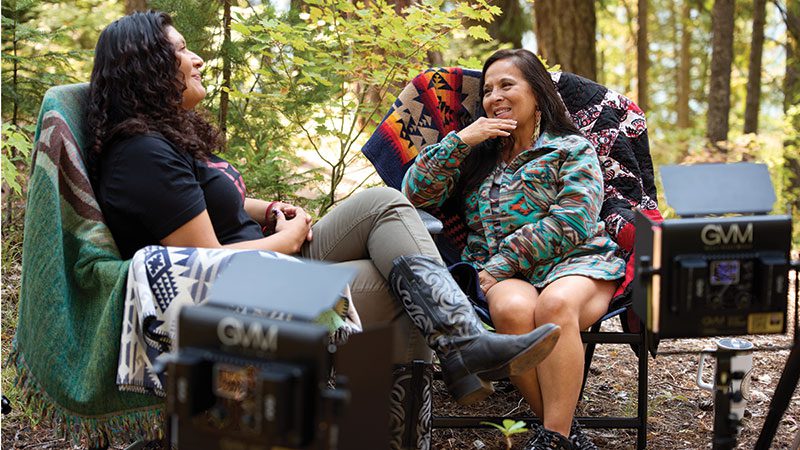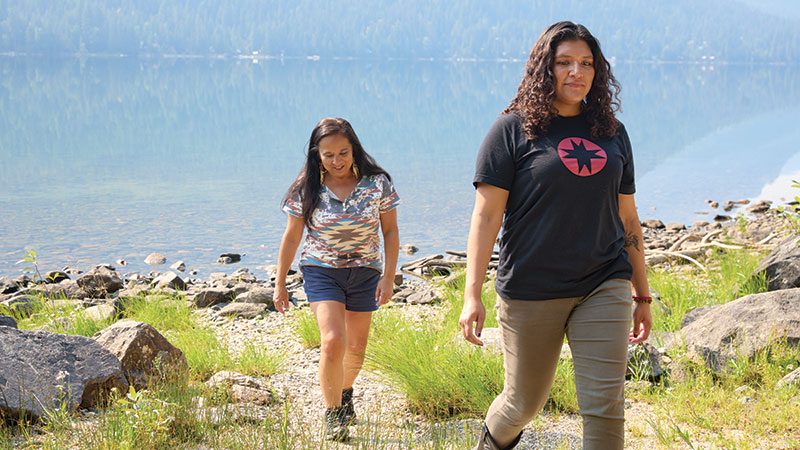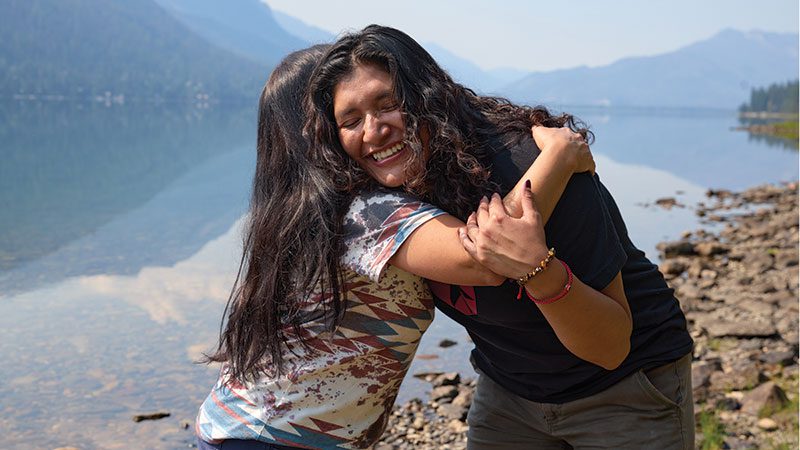Finding home at Seattle’s Daybreak Star

Approaching the Daybreak Star Indian Cultural Center for the first time, Trena Cloyd remembers wanting to run inside.
“I was so excited. I just felt like, oh my gosh, I’m home…,” she recently recalled.
“And then stepping inside the doors, it just felt so at peace, and I don’t know how to explain it, but I’m going “Wow. This is my people.”
Cloyd shared her connections with the center and its parent organization, United Indians of All Tribes Foundation (UIATF), in a new video connected to the foundation’s ongoing partnership with PCC.
About United Indians of All Tribes
UIATF, which provides social, cultural, and educational services for Indigenous people, was founded in 1970 when members of various tribes occupied Ft. Lawton, an Army base that was being decommissioned. Led by the late Bernie Whitebear, members fulfilled the occupation’s goal of creating a cultural home and services on 20 acres of the former military land.
Today, UIATF programs embrace participants at literally every age and stage of life, starting with home visits for parents and caregivers of young children and the long-lived Daybreak Star preschool. A foster care program includes cultural activities, a Native workforce program for those over 18 provides job training and connections, a youth housing program for young adults, and a homelessness prevention program helps at-risk families and individuals. There are special services for veterans, as well as a dining program for elders sharing Native foods and social activities. A radio station showcases Indigenous music and programming, and the annual Seafair Powwow welcomes hundreds of dancers and drummers from across the nation.
“UIATF is a place where Natives can come and be accepted for who they are,” said SiSi Campbell, the foundation’s marketing and communications manager.
The foundation welcomes PCC members and shoppers to connect with its mission and programs at the cultural center in Discovery Park. November also marks a highlight in the connection between the partners.

Honoring Indigenous communities
Thanksgiving is the biggest holiday of the year for the grocery industry, and food co-ops across the country will mark the occasion by reflecting on the legacy of colonization associated with the holiday, while uplifting Native perspectives.
PCC is making a $15,000 donation to UIATF’s far-reaching programs. Additionally, at participating NCG co-ops nationwide, including PCC, a nickel from the sale of each Field Day product in November will be donated to Minneapolis-based North American Traditional Indigenous Food Systems (NATIFS). Last year, inspired by a PCC fundraiser, the national organization raised more than $139,000 for NATIFS from 161 member co-ops.
“Thanksgiving is a time to reflect with gratitude, while also recognizing the history of colonization this day represents,” said Mike Wenrick, PCC’s Director of Purpose. “It’s an opportunity to honor the leadership, cultures, and ongoing contributions of Indigenous communities that continue to guide us forward. We’re honored to be a part of this campaign for a second year.”
While UIATF programs are widely known in the Native American, Alaskan Native and First Nations communities, they aren’t always familiar to others in Seattle.
Campbell hopes more people can take the opportunity “to learn more about such a staple part of the community. We are one of the physical representations of what movements like the American Indian movements can do and can provide for people for future generations.”
People can support their mission in many ways, whether sharing the foundation’s work, supporting it through donations, or helping curate or develop programs. That’s part of how it’s endured for decades, starting with Whitebear’s alliances in the 1970s.
“It was really about communities helping one another get to a better point… really helping us move forward and change laws and change lives and be supportive of each other,” Campbell said.
“I would love for people to know that that spirit is still alive and we coexist in this world together… It’s really about taking the time to learn from each other and to support each other in the ways that we need at that time, because it changes. But there’s always a way.”
For Cloyd, the foundation filled a lifelong yearning.
As a child, she learned only from a classmate’s taunts that she had been adopted as an infant. Her parents were loving, but the older she got, the more she felt “I just need to find out who I am.”
After she was married and had a child of her own, she saw a notice for a workshop on finding birth families. Her adoptive parents had kept her birth name, and she wore a name tag. Stunningly, one of the guest speakers at the event turned out to be her uncle.
He stared at her, stopped his presentation and asked directly “Do you know anything about your parents?” She knew her birth mother’s name and her birthdate – and she looked like her birth father.
Her uncle “just started streaming tears and he goes, “You are my niece,” she recalled.
A new aunt then made a particular effort to include Cloyd in Native events. Her message: You’ve got to go to United Indians to learn more, to attend the Powwow, to be part of its programs.
Now a career counselor for a nonprofit agency in Yakima, Cloyd feels part of her larger Native community.
Cloyd has been struck by the powerful feeling of belonging she’s experienced, often noting how community bonds redefine kinship: “Especially during fishing or hunting season, I know a lot of families are like, “Okay, you’re going to go over to Auntie’s,” but it’s not really your blood Auntie. It’s family.”
Her journey wasn’t all Disney endings. Her adoptive parents were initially pained by her quest to find blood relatives. She had to learn to connect to a new culture. But she’s glad to have what she’s found, and a community she can share with her own two children.
“I’m making that connection and feeling so appreciative that I had the chance to be in both worlds.”

See a new video produced with PCC to learn more about United Indians of All Tribes Foundation.
WATCH IT HERE